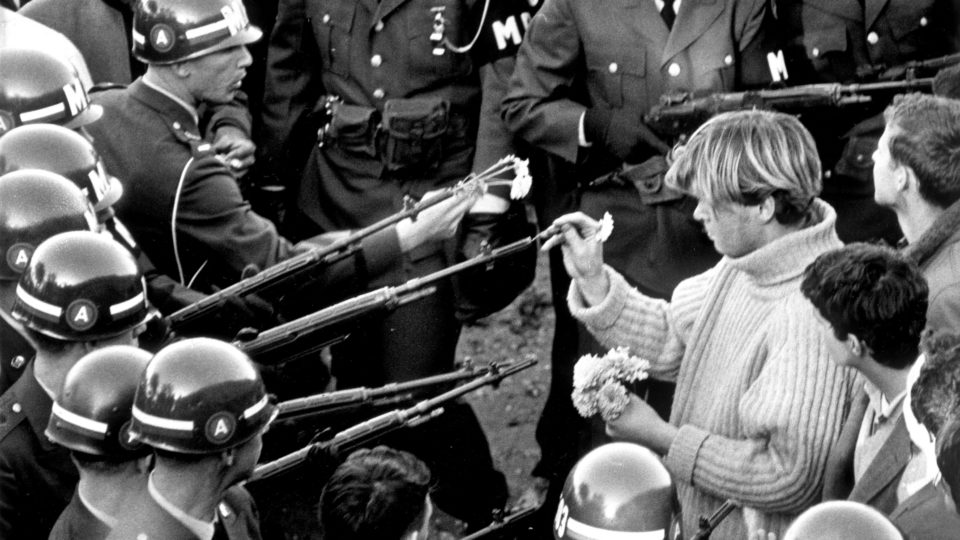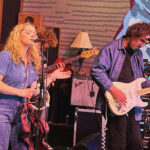On a holiday that celebrates American Independence, the directors take a moment to reflect on the rich history of political activism in music. We are not free until all of us are free.
Abbie Eastman — O Superman by Laurie Anderson
This song is a commentary on the hegemonic role the United States has assumed. While this song was released in the 1980s, it is still relevant today even as political scientists question America’s hegemony. In O Superman, Anderson plays with double meanings, Greek choruses, and a vocoder to give this song its unique sound. These components bring many commonplace ideas of American culture into question, even using the unofficial United States Postal Service creed to do so.
Jack Roche — Land of the Free by Joey Bada$$
This is a self-reflective track where Joey analyzes his place as an African American man in the United States. He meditates on how long they have struggled, how he realizes and continues to fight to change the situation despite the cards are stacked against him. The cards being the State and cultural roadblocks that continue to oppress African Americans.
Jaden Amjadi — Wake Up by Rage Against the Machine
Wake Up is a perfect example of how focused Rage could be in their prime. Above an instrumental which shifts between droning guitars, laid back bass grooves, and funk rock riffs, Zack de la Rocha spits a biting indictment of former FBI director J Edgar Hoover, referencing the wealth of evidence indicating that the bureau had a hand in the murders of Martin Luther King Jr, Malcolm X, and Fred Hampton during Cointelpro. Just before the song reaches its peak, Zach abandons his usual scream to calmly reads quotes from a leaked FBI memo: “…should he abandon his supposed ‘obedience’ to ‘white liberal doctrines’ (nonviolence) and embrace black nationalism….Through counterintelligence it should be possible to pinpoint potential troublemakers and neutralize them…” This often-overlooked and seldom-taught piece of history is important to keep in mind today, as throughout Iowa and the rest of the nation, law enforcement continues to make arrests of peaceful protest leaders.
Ella Heckman — Holiday by Green Day
Holiday was written at the beginning of George W. Bush’s second term as president and a year into the Iraq war and it slaps. In interviews from the American Idiot era, members of Green Day speak about their disenchantment with American politics and their rage against administrations that do not represent their or other voter’s values. Every chord of Holiday cries out against ongoing American imperialism and warmongering. Armstrong says it best in an interview with Spin, “It was attacking America, but it was American at the same time. Patriotism isn’t about being pro-anything. It’s not about being pro-Bush or pro-Kerry. It’s about what you stand for and what you think America represents.”
Jake Jones — Speak To Me by The Relatives
Beautiful song that crosses between gospel, soul, and psychedelic. Such a gem. “What is wrong with America?” 1971, Lewis Records.
(I prefer the original 1971 version to the 2013 “what’s wrong with America?” from Yep Roc Records.)
Luke Bonner — Born in the USA by Bruce Springsteen
This song is probably one of his most famously misunderstood songs, as it was turned into a patriotic anthem its reality is anything but. Springsteen’s “Born in the USA” is a critical, almost satirical anthem of a song written from the point of view of a working-class man forced to kill in the racially charged Vietnam War. Springsteen sings about the plight of the veteran coming back from war lacking government assistance, social services, and empathy as he struggles with the harsh post-war reality. With its depressing verses yet jubilant chorus, it was famously misunderstood by Ronald Reagan himself who used the song at campaign rallies for his 1984 re-election campaign and even mentioned Springsteen in a campaign speech. However, the true meaning of the song isn’t the patriotism some imagine in it, the triumphant sounding chorus, or even the American flag on the album’s cover. The meaning is the harsh reality in the verses that state being American is constantly feeling lost and searching for truth.
Elsa Richardson-Bach: Stevie Wonder – Big Brother by Stevie Wonder
Stevie Wonder, inspired by Geoge Orwell’s 1984, wrote “Big Brother” in the midst of Nixon’s re-election campaign and the Vietnam War. The song’s lyrics reference the novel while simultaneously criticizing the American government’s hypocrisy and failings to citizens. Particularly powerful lines are “You say that you’re tired of my protesting / Children dying every day” and “I live in the ghetto / You just come to visit me ‘round election time.” The first lyric refers to the Vietnam War and the young soldiers drafted to fight, as well as the innocent Vietnamese citizens being killed in the crossfire. The second line calls out the hypocrisy of Nixon’s campaign, criticizing an indifferent government that pretends to care about Black Americans and poverty-stricken areas only when it benefits them. These specific lyrics, along with the rest of the song, had layers of meaning at the time Wonder wrote them, and they continue to be relevant nearly fifty years later.
Elisabeth Oster – Strange Fruit by Billie Holiday
Sometimes, to fully understand the dire nature of systemic racism ingrained in a country’s structure, you have to go back to its beginnings of protest. The song, first performed by Billie Holiday in 1939, is credited for inspiring many leaders of the Civil Rights Movement decades later. Holiday’s delicate voice doesn’t take on the song’s explosive lyrics until over a minute into the song; the lyrics themselves only span three verses, but those three verses are biting and visceral. A direct response to the overwhelming number of lynchings of Black citizens in the South, the poetic and upsetting verses compare these victims to fruit on a tree. Holiday criticizes not only the lynchings that America allowed, as she sneers at the facade and romanticism the country hoisted onto the South to hide the uglier backside entrenched in racism: “Pastoral scene of the gallant South / the bulging eyes and the twisted mouth / scent of magnolia sweet and fresh / Then the sudden smell of burning flesh.” The graphic nature was uncommon at the time, but allowed the song to transcend and resonate for generations to come around the structural racism that festers in America. This haunting and atmospheric rally cry particularly resonates now. Holiday criticized the country for treating Black Americans as lifeless objects—”a strange and bitter crop”—a heartbreaking reality still evident in current headlines today as the bitter injustice is ripped from behind the facade yet again.




